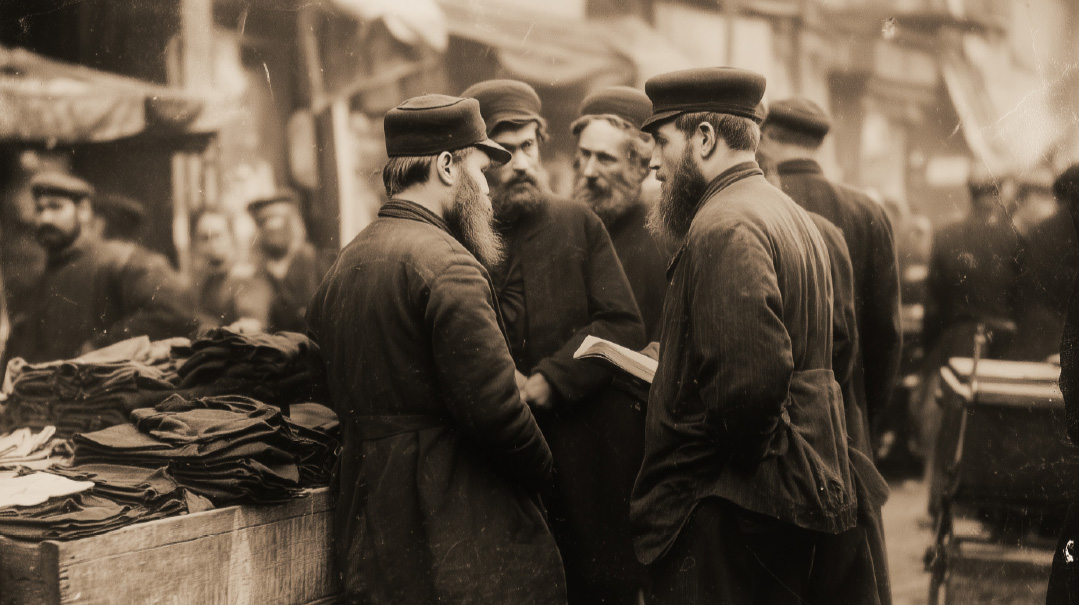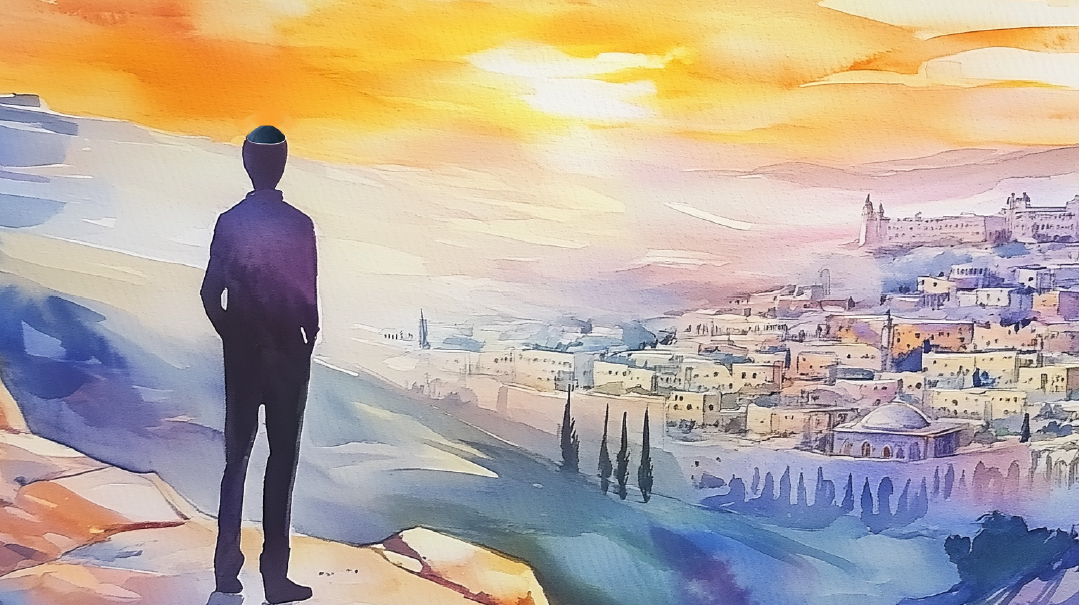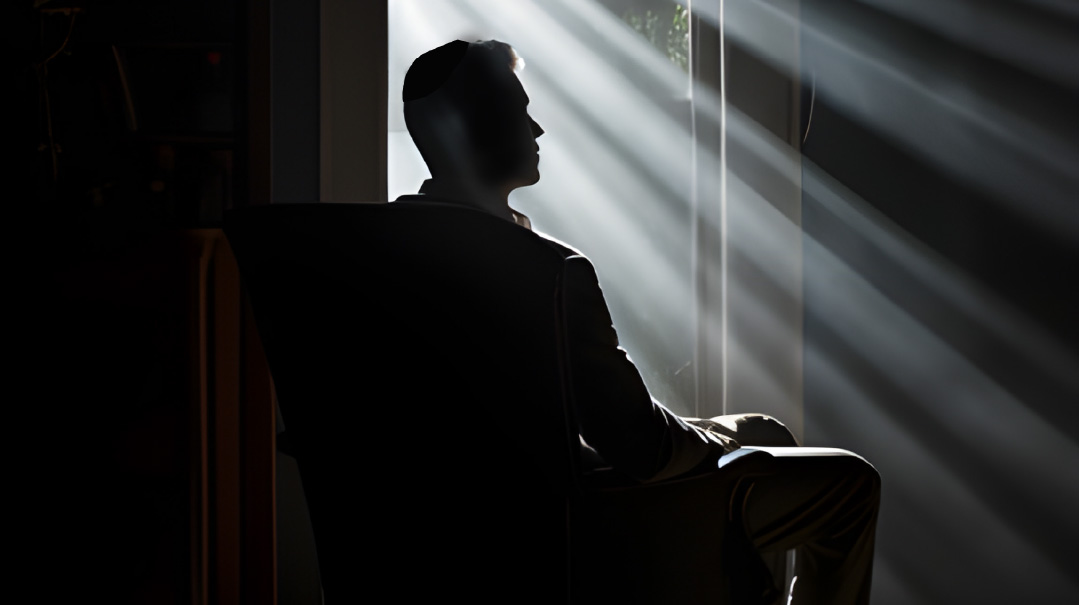Return Trip

I wanted to create the perfect image, but inside there was just a black void. I tried filling that hole with approval, and I tried filling it with fun, but none of those things were the right shape for the empty space inside me. Until I hit rock bottom

Ever since I was a kid I was different. I had a unique nature all my own and I fought myself and the whole world. And I was winning — or losing depending how you look at it. But I turned it around. I’m not just a straightened-out version of the old Avi. I’m a new person — physically emotionally and spiritually. I made it and I’m still climbing. This is my journey.
It All Started When…
Avi
I
t sounds crazy but it started when I was really young. Much younger than my parents realized. I was a model child always on my best behavior. I was a real people pleaser because the most important thing in my life was to make sure that everyone thought I was perfect. And I was smart and helpful and did everything anyone asked of me without complaint so I earned that recognition I craved. I hated learning but I always performed well because I loved the attention I got for it. I would lie about how much I chazered in order to earn prizes. I was technically frum but was totally disconnected from Hashem. I went through the motions but I was angry at G-d.
I was only in third grade when I started stealing money from my parents to buy stuff I wanted. At first it was nosh but as I got older it was other stuff. I rationalized that it was okay to steal because my parents never gave me spending money. Of course I never asked them for any because that would ruin the picture-perfect image I was trying to portray.
I wanted excitement first exciting stuff then exciting experiences. I always wanted the next thing something new. I had no spiritual connection and davening Shabbos learning mitzvos Yamim Tovim were meaningless to me. I hated the lifestyle my parents lived. Sure they explained things to me if I asked but I didn’t care about answers I just wanted to have fun. Besides asking questions would have changed their picture-perfect perception of me — that image I worked so hard to create and maintain.
There was something missing in my life: a true spiritual connection. I tried filling that hole with approval and I tried filling it with fun but none of those things were the right shape for the empty space inside me.
When you compare what my parents thought about my childhood to what I thought the contrast is unbelievable — but I put all my energy into creating that façade. Yet as I got older the gap between who I pretended to be and who I really was had widened too much; by the time I started eighth grade I was no longer willing to do what it took to keep pretending.
Malka
L
ooking back I search for foreshadowing for the red flags I may have missed. Avi was a model child a parent’s dream always eager to please and happy to help out well-behaved and adored by his parents and nine siblings. He had blond hair a charming smile and shining eyes. He was bright and well-adjusted a little gentleman. Of all our sons my husband had the closest relationship with Avi and he got a lot of attention from everyone in the family. We didn’t expect perfection from him and we always explained anything he wanted to know and gave him choices. We noticed what we thought was a certain strength of character: If there was ever something Avi wanted that we didn’t allow or even just disapproved of he would always acquiesce to our wishes. Even when we gave him the choice he always took the high road — with a smile. Some of our children struggled in different ways but Avi was a delight. I remember once watching a friend of mine walking with her struggling teen son and thinking “I’m done with that. All the older boys are grown — and Avi never.
The Downward Spiral
Malka
Not only did we refuse to throw Avi out of the house we actively did everything possible to keep him actually physically inside the house. We let him — even encouraged him — to bring any sort of friends home tried to make them feel welcome; although we ourselves didn’t own a TV or have Internet access at home we got him his own TV and laptop with full Internet access. Our belief was that any moment he spent in the house was a moment he was not on the street and for that moment at least he was safe.
Avi
Maybe my parents were in denial at first or maybe it just didn’t make sense to them; I do know that I tried to hide it making up excuses lying stealing covering up. They did all the right things — found me outlets gave me leeway tested me for learning disabilities… But I spiraled downward going in and out of yeshivahs getting into worse and worse trouble.
My parents gave me whatever I wanted. They thought they were keeping me safe but in reality they were enabling me to stay comfortable where I was so I didn’t have to change. I rode the merry-go-round from therapist to professional to doctor to rabbi around and around. I told them all why I went off the derech how hard my life was and they all felt bad for me and validated my feelings. I took that and ran with it. When they validated my feelings it gave me no reason to change. And so I didn’t.
There were some who didn’t validate my feelings. I cut ties with them. No one had a solution for me.
The Turning Point
Malka
Once on our way home from the psych ward I blurted out “If you could live your life again would you do drugs?” Without even pausing to think he replied “Of course. Show me how to fix my life and I’ll stop using. Until then what else is there?”
What else? How about meaning and purpose? But Avi didn’t have that, so he really had nothing.
I remember a conversation I had with someone who tried convincing me to force Avi into a certain program. I refused, saying it was worthless to send him unless he went willingly. “He has to want to go,” I insisted. “He has to want to get better. He’s not ready yet. He hasn’t yet hit rock bottom.” I’ll never forget his response: “Rock bottom is the grave.”
There was nothing I could do. Until Avi wanted to change and was willing to do the work, we were helpless.
Avi
The overdose was inevitable. When something is valuable you care for it, but when something is worthless you don’t worry about the risk. By then, life was worthless. My mother found me unresponsive and called Hatzolah; I went from the ER to the psych ward.
The psych ward was a horror story. When I finally got out of there I knew one thing: I never wanted to go back there again. I went home determined to stay clean.
At some point toward evening, I went over to a friend, and I decided to go outside for a cigarette. I stood up and suddenly the thought popped into my head: A beer would be nice.
At that moment I totally forgot about everything that had happened over the past five days. I forgot about the overdose, the hospital, and the police. I forgot that 12 hours ago I had been in the psych ward and I forgot that five minutes ago I had sworn never to land back there. My mind shut down. Like a robot I walked to the fridge, took the beer. I drank that beer and then I drank another one. I drank until I blacked out.
Later on, I would pinpoint that incident in my acknowledgment that I was an addict. Addiction is not about what you use, or when you use, or how much. Addiction is when your mind shuts down and there’s nothing in the universe that can stop you from doing something that you yourself do not want to do. At that moment I experienced the most terrifying feeling I have ever felt in my life: total loss of control. It’s like you’re driving at 100 miles per hour and suddenly your brakes fail. Even though I almost died, even though I never wanted to go back to that psych ward, even though I desperately didn’t want to use, I was going to use, and use, and use, and there was nothing in this world that was going to be able to stop me.
This Way Out
Avi
I was finally willing to go to rehab, and there was only one place I was willing to go.
I had been sitting with a friend in my car one day a year before, idling outside my parents’ house. That red GTI sports car told the entire story.
Then Akiva walked by. He grinned when he saw us and eased himself into the car, chatting with Joe in the back seat. I didn’t chat with Akiva; I stared at him. Akiva had issues since he was born — he had a violent, angry nature and he was off the derech and an alcoholic by the time he was 12. I knew Akiva had come back — he’d tried to reach out to me many times. But for the first time I noticed that there was something different about Akiva.
I knew lots of guys who went to therapy, or rehab, or whatever. The guys I knew who came back avoided me. They were afraid I would trip them up, influence them. Those guys walked around with a hunted look in their eyes. Sure, they had recovered. But inside, they were the same as before. It was only a matter of time.
Akiva was different from those guys. Akiva was cool to sit in my sports car and talk to Joe and me. Akiva wasn’t afraid that catching up with an old friend would cause him to relapse. Because Akiva wasn’t the same person anymore. He was calm, and confident, and at ease with himself and the world. He walked like he knew where he was going. He talked like he had answers.
Now I was finally ready to get help and I knew one thing. I was going to do whatever Akiva had done. I didn’t just want to be the same me, just a clean and sanitized version. I wanted to be a new person.
Malka
They say an addict has to hit rock bottom, but what’s a parent to do? Sit around and wait for that to happen? You risk your kid dying before they get help. But there’s a secret weapon that Avi’s experience with Akiva illustrates: It takes an addict to help an addict. An addict could understand him enough to effectively encourage him to pursue change. Only an addict can win an addict’s trust. Someone who has been there can show him the way.
A Good Metaphor Is
Malka
Cancer.
Avi was 15 when he was thrown out of yeshivah. Right around then, my cousin’s son was diagnosed with a brain tumor. He was the same age as Avi. I kept telling myself, Yehuda has cancer in his brain, Avi has cancer in his neshamah.
Yehuda was niftar one year after his diagnosis, at age 16. By then Avi’s “disease” had also progressed, his condition had also drastically deteriorated. We stood at the kevurah and I watched my cousin bury her son. Yehuda died with a pure neshamah, I thought to myself. I didn’t know if Avi would make it.
Cancer is a good metaphor for another reason. Cancer is something that happens to you. Cancer is something that you can’t really prevent. And it’s the same thing when a child goes off the derech. You can try to protect yourself, just like you can use sunscreen and avoid smoking, but you can’t completely prevent it. Being struck with the nisyaon of one’s child leaving Torah is like being struck with the nisayon of illness.
Avi
The cancer metaphor resonates in another area. I was finally committed to being clean because I wanted to be. I was entering the rehab program I had personally chosen because I knew it offered the greatest chance for my success. But even then I couldn’t stay clean: Before leaving for the airport, I disguised vodka in a water bottle so I could take it with me. I got so drunk, I missed the plane. Even as I took the steps to try to beat my addiction, the addiction was so powerful that I was acting against my own interests. I wanted desperately to be clean — and I was still using! Clearly, I couldn’t do this alone.
The fact was that I needed Hashem. Without Him, I was going to die.
I was desperate. I had as much control over my illness as a cancer patient has over his: none. The only one who could help me was Hashem.
I was angry at Hashem, and my resentment spilled over to anything even remotely related to religion. But if someone has cancer, they want the best doctor out there. They don’t care if he is friendly or rude or good looking or ugly. They don’t care if they personally like him or dislike him. All they care about is that he’s the one who can help. I was that cancer patient. I was dying. And the only one who could help me was Hashem. And even though I didn’t like Him, and even though I was angry at Him, I was willing to put aside my personal feelings, because I knew so clearly and so completely that there was absolutely no one else who could help me.
(Eventually, I would work through that anger. I’d come to realize that the problem was not with Hashem or my parents or religion, but with me, and I would resolve that anger. But that came later in my journey.)
When I was a kid, I was technically frum, but I was disconnected spiritually. I had no relationship with Hashem. From this moment on, building that relationship became the most important thing in my life. Right now, I was powerless, and I needed Him.
I didn’t go to rehab with any intention of becoming religious. But taking the first step toward putting my life back together also brought me to the very first step of my return to Hashem.
This One is Different
Avi
I’d been to the hospital, to the psych ward, to jail, to detox, to rehab. But the rehab center in Florida was different from anything else I’d tried before, because it wasn’t built on the medical model but on the spiritual model. Rehab programs built on the medical model have a relapse rate of above 90 percent — look it up yourself. This program has a 0 percent relapse rate — 100 percent recovery rate — only for clients who stay in the program through the ninth step and maintain the spiritual way of life. And the main difference is this: The medical model believes that the addict has the power to stop. The spiritual model acknowledges that the only one with any power is Hashem.
Now I know I that I had been running away from the very thing I was searching for: an authentic spiritual connection.
Drugs offered me a false sense of connection. But now I have the real thing. I don’t crave drugs anymore, I don’t need drugs anymore, I don’t want drugs anymore, because this rehab place helped me create the spiritual connection I was missing.
The previous rehabs didn’t work because they weren’t spirituality based. Those programs focus on the concept that if you can avoid your “triggers,” you can avoid your addiction. But life doesn’t work like that. Triggers are everywhere. Trigger is just another word for excuse. It’s not the triggers that are the issue. Spirituality is the issue. The medical model is treating the wrong problem. And that’s why it fails.
Whose Fault Was It?
Avi
Mine. I recovered, and became frum again, only because I took responsibility for my own actions. My problems weren’t because my parents didn’t understand me or because my rebbeim had wronged me or because frum people are hypocrites or because the Torah is too restrictive. Every person makes choices. Sometimes your personal circumstances are painful, and require hard work — and I chose not to do that work. It might be true that my parents or rebbeim wronged me. But I had to take responsibility for my own choices.
Once I recognized that my problems were my own fault, and not my parents’ fault, I was able to reconcile with my parents. In recovery, I faced the “reasons” I had stopped being frum. And they didn’t hold water. They were just excuses, justifications, rationalizations, so I could do whatever I wanted. There is nothing, absolutely nothing, that anyone could have done at any point that would have prevented me from going off the derech. Without a spiritual connection, I had wanted to leave religion, so I had created the reasons to do so.
Malka
Was I a perfect parent? Of course not. Did I try my absolute hardest, at every point, to be the best parent and person possible? Yes. That was the only choice I had available to me — what I was going to do. But I couldn’t make Avi’s choices for him.
One of life’s unthinkable questions: What’s the appropriate reaction when you see your child being mechallel Shabbos? Answer: Sadness. But not anger. Do you feel anger when you see someone else’s child being mechallel Shabbos? No — only sadness, a deep, wrenching sadness for all that they are missing.
Today and Forever
Avi
Recognizing that I needed Hashem’s help forced me to face another truth. I’m asking Hashem to save me, but why should He? So that I can continue making poor choices, hurting people, denying His existence? Clearly, I would have to commit to living my life according to His will.
All this didn’t mean I woke up the next morning in a black hat and white shirt and started learning for 18 hours a day. It was a process — an ongoing process. But the program made me honest. Honest about myself, and honest about Hashem. And honestly? What Hashem wanted from me was that I should keep the mitzvos and live a Torah life.
I’m frum again, although maybe “again” is not the right word. For the first time I am truly frum, having made the choice, step by step, to live with Hashem in my life, to live my life according to Hashem.
I have a real relationship with my parents. They are involved in my life; I call my mother almost every day.
I am back in yeshivah full time and I made my mother laugh when I told her that she’ll know I’m a real yeshivah bochur when I start taking a nap in the afternoon….
Sometimes I wonder how I got here. Why did I make it, when so many others I know… didn’t? I believe a big part of the answer is so that I can help other people who are now where I once was. If there’s anyone who can benefit from my experiences, I want to help them.
I’m working hard, I’m helping others, and I’m happy. Life is purposeful, meaningful, wonderful. I’m looking forward to a great future.
Malka
I’m a different person because of our experiences with Avi. I changed and grew tremendously through this challenge. That’s the message I have for other mothers: It’s not only about your child. It’s about you. Who Hashem wants you to become, what Hashem wants you to do with this situation. After all, you can’t change the world. You can’t change your addicted child. The only one you can change is yourself.
What Can a Parent Do?
Malka
You can do hishtadlus: teach children about personal safety, teach children about Hashem, daven and daven and daven. But there is no fail-safe method to protect children from making poor choices. It sounds discouraging, but it’s not — we’re here in order to grow, and challenges make us grow. If a child has cancer, everyone in the family suffers, and hopefully they also grow. A family where one child goes off the derech will suffer, but those circumstances are a test so they can grow. Our whole family did.
Avi
Teach your kids to build a personal relationship with Hashem. Live it yourself, set the example for how to build a connection with Hashem. If your kid shows signs of spiritual disconnect, take a look at your life, and model spiritual work; hopefully your child will mirror your actions. Don’t just teach them the do’s and don’ts, teach your kids about Hashem — Who is He? Why did He put us here? Everything has a reason and a meaning, and if you want your kids to choose meaningful things over meaningless things, they’re going to need to know those reasons and meanings.
Look, tough stuff happens. You don’t want your kid to get stuck in the “no fair” mindset, which leads right to “I can do whatever I want because something bad happened to me.” Teach your kids that life is not fair — but it is purposeful. And make sure they know what that purpose is. But even with all that, everyone makes their own choices.
There is never a guarantee.
But my story is proof that there is always hope.
(Originally featured in Mishpacha Issue 629)
The protoganist can be contacted through Mishpacha.
Oops! We could not locate your form.













